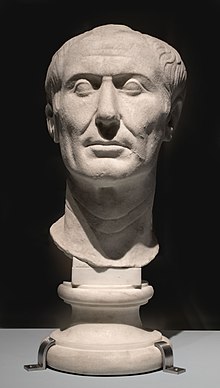
Back Caesar (Titel) ALS قيصر (لقب) Arabic Sezar (titul) AZ Цэзар (тытул) BE Цезар (титла) Bulgarian Caesar (titl) BR Cèsar (títol) Catalan Sesar CEB Caesar Czech Cæsar (titel) Danish
 Sculpture depiction of Julius Caesar | |
| Pronunciation | English: /ˈsiːzər/ SEE-zər Classical Latin: [ˈkae̯sar] |
|---|---|
| Gender | Male |
| Language(s) | Latin |
| Origin | |
| Region of origin | Roman Empire |
| Other names | |
| Variant form(s) | |
| Popularity | see popular names |
 |
|---|
| Periods |
|
| Constitution |
| Political institutions |
| Assemblies |
| Ordinary magistrates |
| Extraordinary magistrates |
| Public law |
| Senatus consultum ultimum |
| Titles and honours |
Caesar (Latin: [ˈkae̯.sar] English pl. Caesars; Latin pl. Caesares; in Greek: Καῖσαρ Kaîsar) is a title of imperial character. It derives from the cognomen of the Roman dictator Julius Caesar. The change from being a surname to a title used by the Roman emperors can be traced to AD 68, following the fall of the Julio-Claudian dynasty. When used on its own, the title denoted heirs apparent, who would later adopt the title Augustus on accession.[1] The title remained an essential part of the style of the emperors, and became the word for "emperor" in some languages, such as German (kaiser) and Slavic (tsar).
- ^ Greenidge 1901, p. 353-355.